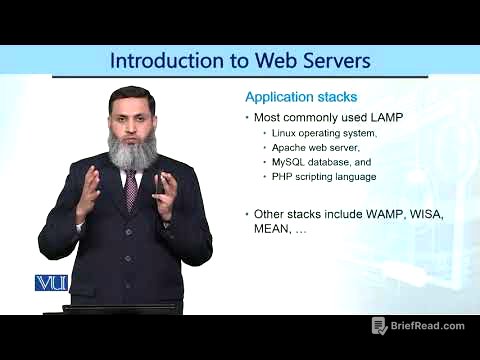TLDR;
This video features an interview with Carlton Dennis, a tax strategist who shares his insights on how high-income earners can legally minimize their tax liabilities. He discusses strategies such as investing in short-term rentals, structuring businesses as S corporations, and utilizing private family foundations. Dennis emphasizes the importance of understanding tax laws and leveraging them to one's advantage, advocating for proactive tax planning rather than reactive measures.
- High-income earners can legally minimize tax liabilities.
- Short-term rentals, S corporations, and private family foundations are effective tax strategies.
- Understanding and leveraging tax laws is crucial for financial success.
Introduction: Interview with Carlton Dennis [0:00]
The interviewer introduces Carlton Dennis, a successful entrepreneur who earned over $7 million last year and paid virtually no federal income tax. Dennis is presented as an expert in tax strategies, particularly for high-income earners, with the goal of teaching viewers how to retain more of their earnings by legally avoiding excessive taxation. The introduction highlights Dennis's impressive car collection, including a G Wagon and a Lamborghini truck, symbolizing his financial success through tax optimization.
Carlton's Financial Success and Tax Strategies [1:01]
Carlton Dennis shares that his earnings have increased to over $11.5 million in 2023-2024. He emphasizes that while he paid some state taxes, his federal tax liability was minimal due to his strategic approach to tax planning. Dennis highlights his expertise in income shifting, depreciation, and using a private family foundation for charitable contributions to legally reduce his tax burden. He stresses that his strategies are based on a thorough understanding and application of the tax code, not on illegal activities.
Tax Strategies for W2 and 1099 Employees [3:31]
Dennis recommends that individuals with W2 or 1099 income consider investing in short-term rentals to offset their tax liabilities. By actively managing a short-term rental property for over 100 hours a year, taxpayers can qualify it as an active business. This allows them to conduct a cost segregation study, creating paper losses that can offset their regular income. He also suggests that if a spouse is not working, they can be designated as a real estate professional to further enhance these tax benefits.
Tax Strategies for New Business Owners [4:46]
For those starting a business and earning their first six-figure income, Dennis advises examining their business structure. While operating as a sole proprietorship or single-member LLC is acceptable initially, he recommends transitioning to an S corporation once income exceeds $50,000 to $60,000. This move allows business owners to pay themselves a salary and only pay the 15.3% self-employment tax on that amount, avoiding the tax on the remaining business profits. Additionally, Dennis advises business owners to allocate personal expenses, such as phone bills and travel, to the business if they qualify as legitimate business expenses.
Wealthy vs. Middle Class Approach to Taxes [6:16]
Dennis contrasts the tax approaches of the wealthy and the middle class, noting that wealthy individuals are more willing to invest in strategies to avoid taxes, understanding that spending money is necessary to play the game with "Uncle Sam." In contrast, the middle class tends to be more hesitant to spend money on tax planning, often missing opportunities to offset their tax liabilities. Dennis estimates that he has saved his clients over $100 million in taxes.
Case Study: Saving a Client with a Yacht [7:12]
Dennis shares a story about a client who was facing an IRS audit for including a yacht as a business expense. The client, a real estate agent, used the yacht to showcase million-dollar properties to athletes and entertainers. Dennis successfully defended her by arguing that the yacht was a legitimate business expense under code section 162a, which allows deductions for expenses that are ordinary, necessary, and reasonable for the business.
Depreciating Luxury Vehicles for Tax Benefits [8:34]
Dennis discusses how purchasing luxury vehicles like G Wagons and Lamborghinis can provide significant tax benefits through depreciation. He explains that if a vehicle has a gross vehicle weight rating over 6,000 pounds and is used for business purposes more than 50% of the time, the IRS allows for deducting the purchase price on the tax return using Section 179 and Section 168k. Dennis also touches on bonus depreciation, noting that it was 80% in 2023 and 60% in 2024, with potential for it to return to 100% if Donald Trump is re-elected.
Leveraging Debt and Understanding Good vs. Bad Debt [11:49]
Dennis explains the concept of good debt versus bad debt, defining good debt as loans for assets that can appreciate over time, such as real estate. He emphasizes the benefits of real estate due to the ability to obtain cash-out refinancing or HELOCs, allowing investors to leverage their investments. He also highlights the importance of building relationships with bankers to access credit and private funding opportunities.
Tax Strategy Blueprint for a $100,000 Income Earner [14:11]
Dennis outlines a tax strategy for someone earning $100,000 annually. He suggests purchasing a $500,000 property with a $100,000 down payment and turning it into a short-term rental. By managing the property actively and conducting a cost segregation study, the individual can create a $100,000 paper loss, effectively offsetting their entire income and eliminating their tax liability.
The Augusta Rule: A Little-Known Tax Tip [16:22]
Dennis shares a little-known tax tip called the Augusta Rule, which allows homeowners to rent out their residence for up to 14 days per year without paying taxes on the rental income. This rule originated from the need for housing during the Masters Golf Tournament in Augusta, Georgia. Dennis suggests that business owners can leverage this rule by renting their home to their own S corporation for 14 days, deducting the rental expense on the corporate tax return while receiving the income tax-free.
Contact Information and Closing Remarks [17:49]
Dennis provides his contact information, including his company website (tax alchemy.com), YouTube channel (Carlton Dennis), and Instagram handle. He offers to answer tax-related questions for free. The interviewer thanks Dennis for sharing his expertise and encourages viewers to connect with him.









